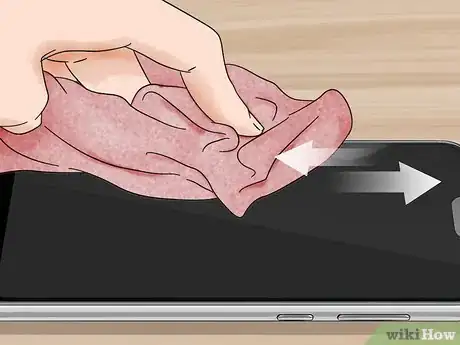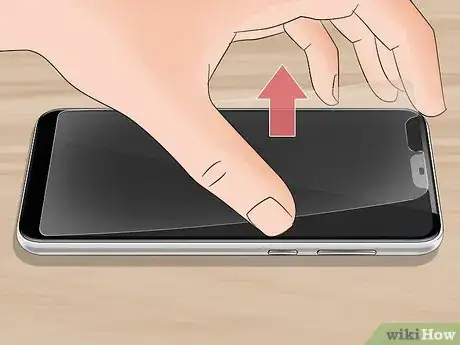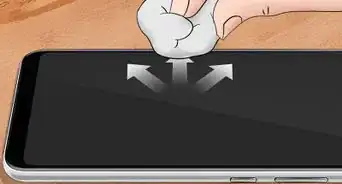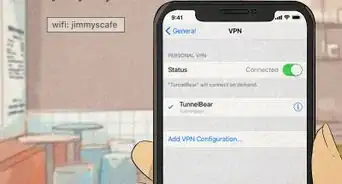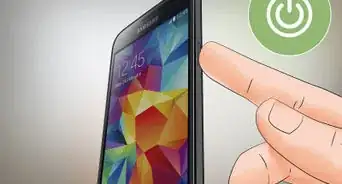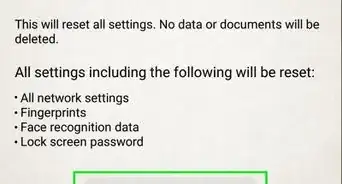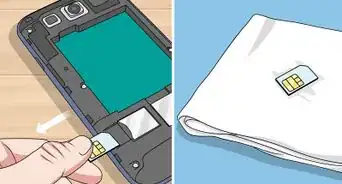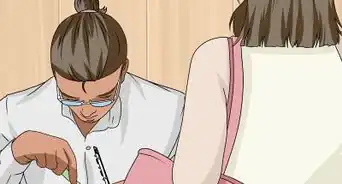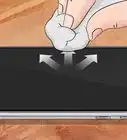This article was co-authored by Filip Boksa. Filip Boksa is the CEO and Founder of King of Maids, a U.S. based home cleaning service that helps clients with cleaning and organization.
There are 9 references cited in this article, which can be found at the bottom of the page.
This article has been viewed 48,648 times.
There’s nothing more frustrating than taking off your screen protector just to see that all the adhesive has been left behind, creating a sticky, smeary mess. It can make it hard to use your phone and it doesn’t look good! Taking care of leftover glue and adhesive is important if you want your screen to operate at its best.
Steps
Removing Sticky Adhesive
-
1Turn off your phone so it’s easier to see where the leftover glue is. Plus, this will eliminate the risk of accidentally calling your boss or liking a crush’s Instagram post. Powering down will highlight where you need to clean the screen so that it’ll look like new again.[1]
- Depending on how thick your phone case is, you may also want to remove it. If it’s super bulky, it could be hard to clean the edges of the screen thoroughly.
-
2Use a clean lint-free cloth to wipe down the screen. Sometimes, the glue may come away just by gently rubbing it back and forth with a soft cloth. If nothing else, this process will remove any smudges or streaks so that all you’re left with is the glue you need to clean off.[2]
- A microfiber cloth would also work well for this process.
- You should never use paper towels or tissues to clean your screen. They can leave behind little bits of lint or could even potentially scratch your screen.
Advertisement -
3Dip a lint-free cloth in cooking oil and gently rub it into the adhesive. Cooking oil is gentle and won’t harm the natural protective layer on your phone. Plus, the oil is good at loosening sticky adhesives. Use your pointer finger to gently rub the areas that are sticky until they start to come clean.[3]
- When applying the cooking oil to the cloth, just a little dab will do. You don’t want to use a dripping-wet cloth and risk getting oil into your speaker or charging port.
- To clean off the oil afterward, wipe the screen down with a clean microfiber cloth several times.
-
4Try using rubbing alcohol if cooking oil doesn’t lift the glue. Don’t pour rubbing alcohol on your phone—instead, dip a corner of a lint-free cloth into the rubbing alcohol. Gently work the rubbing alcohol into the adhesive until it starts to come away from the glass. If the alcohol on the cloth dries out, apply a little bit more.[4]
- Make sure to put the cap back on the rubbing alcohol or move it away from where you’re working. You don’t want it to fall over and spill onto your phone!
- You can use nail polish instead of rubbing alcohol if you prefer.
Warning: Don’t use Windex or other harsh cleaning products on your phone. They can actually break down the oil-resistant layer that’s covering the glass and make it less sensitive to touch.[5]
-
5Give mayonnaise a try to soften and remove the adhesive. Carefully apply a very thin layer of mayo over the leftover glue on your screen. You can do this with your finger, or put the mayo on a clean lint-free cloth and wipe it onto the screen. Leave it alone for about 20 minutes, and then gently rub away the glue.[6]
- Once you’re done cleaning your screen, you may want to wipe it down several times with a clean microfiber cloth.
- Be careful to not get any mayonnaise in the speaker or charging port.
Peeling off a Screen Protector
-
1Loosen up the adhesive with a 15-second blast of heat from a hairdryer. This is optional and you can do it at any point during the process if you feel things aren’t progressing very well. Hold the hairdryer about 12 inches (300 mm) away from your screen and move it back and forth for 15 seconds.[7]
- Don’t hold the hairdryer against your phone or point it at one spot for too long.
-
2Test each corner of the screen protectors to find one that is a little loose. Gently pry at the corner with a fingernail to see if it’ll start coming away from the screen. You could also use the corner of a credit card or a very thick piece of paper.[8]
- You may also find it useful to use a toothpick. Just be sure to angle the toothpick up so that it doesn’t scratch the screen when it slips under the protector.
-
3Work your way around the edge of the screen to loosen the protector. Especially if your screen protector is made of tempered glass, you don’t want to just rip it up as soon as you find a loose edge. Instead, go around the entire protector with your finger, a credit card, or a toothpick and separate the screen from the sheet.[9]
- Doing this slowly should also help prevent the adhesive from sticking to your screen.
-
4Peel the protector off slowly and remove it from your phone. Try your best to keep the protector as even as possible so it doesn’t bend and break. If you want to use it again, set it to the side, adhesive-side up.[10]
- If you notice adhesive sticking to your screen, try gently pushing the protector back into place and removing it even more slowly. The hope here is that the adhesive will stay with the protector instead of your screen.
Warnings
Things You’ll Need
Removing Sticky Adhesive
- Lint-free cloth
- Microfiber cloth
- Cooking oil (optional)
- Rubbing alcohol (optional)
- Mayonnaise (optional)
Peeling off a Screen Protector
- Hairdryer
- Credit card (optional)
- Toothpick (optional)
References
- ↑ https://www.cleanipedia.com/gb/in-the-home/computer-cleaning-how-to-clean-your-computer-and-keyboard.html
- ↑ https://www.hellotech.com/blog/how-to-clean-and-sanitize-your-phone-screen-properly
- ↑ https://www.bobvila.com/articles/how-to-remove-sticker-residue/
- ↑ https://www.cleanipedia.com/gb/in-the-home/cleaning-ipad-tv-and-computer-screens.html
- ↑ https://www.businessinsider.com/how-to-clean-iphone-screen
- ↑ https://www.thekitchn.com/7-surprising-things-you-can-clean-with-mayo-22932269
- ↑ https://www.ubreakifix.com/blog/remove-screen-protector
- ↑ https://www.ubreakifix.com/blog/remove-screen-protector
- ↑ https://www.ubreakifix.com/blog/remove-screen-protector

